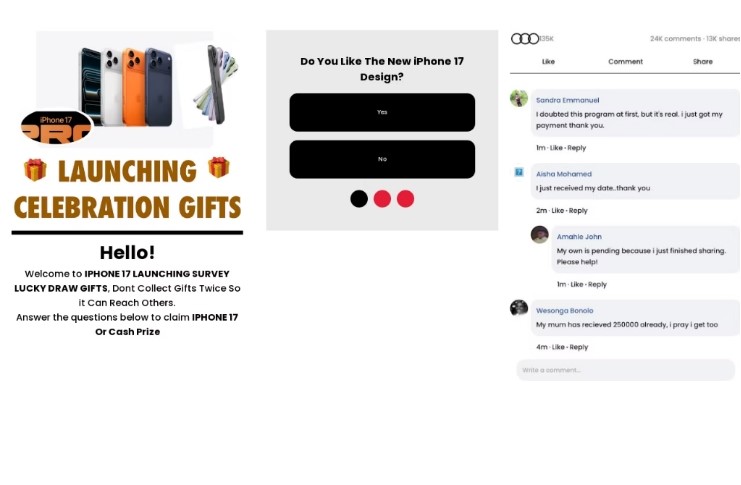Accordingly, cybercriminals have set up a series of fake websites, fake online lotteries and tricks to recruit "production testing users" to collect personal information and financial data of users. These attacks pose serious risks, ranging from personal data loss to financial losses.
One of the common tricks is fake Apple Store websites, deceiving users with an offer to pre-book an iPhone 17 before its out of stock. When customers enter payment information, scammers will steal bank card data instead of making real transactions.
The scammers also launched fake lottery programs with the promise of giving the winner a free iPhone. They require participants to complete the survey, provide personal information such as email, phone number... and pay a delivery fee or service fee.
To increase persuasion, these fraudulent sites even attach fake comments from "users" affirming that they have received rewards, making it easier for victims to trust and fall into traps.
Not stopping there, the scammer also advertised the opportunity to become the "first to experience" iPhone 17. This trick targets users who are knowledgeable about technology, luring them to provide contact information, delivery addresses and pay a shipping fee in exchange for "early testing equipment". However, in reality, none of the products were sent. Instead, victims will have to receive a series of junk emails, or become targets of the next sophisticated fraud campaigns.

Ms. Tatyana Shcherbakova - Web Content Analysis expert at Kaspersky - commented: "Circumbers always know how to take advantage of the heat from major product launches, turning user excitement into an opportunity to steal data.
According to our observations, scams are becoming more and more sophisticated, no longer just basic fake emails, but have been improved into websites with interface designs similar to official websites. Users need to be vigilant and always verify information, instead of acting emotionally, to avoid becoming victims of these threats.
Kaspersky recommends that users take the following measures to proactively protect themselves from the wave of eating scams following the iPhone 17 launch event:
Only buy from official sources: Order via Apple's website, authorized retailers or verified network operators, avoid accessing fake pages.
Always check the link, be careful with suspicious promotions: Don't click on email, text messages or automatic advertisements promising promotions or winning prizes.
Do not share personal data to receive "free" gifts: Prestigious programs rarely require sensitive information from the beginning. If asked for your name, card number or address, consider it a warning sign.
Unblock multi-factor authentication and track your account: Activate two-factor authentication (Two-Factor Authentication - 2FA) for Apple ID and financial applications, and regularly check your statement for early detection of unusual transactions.











